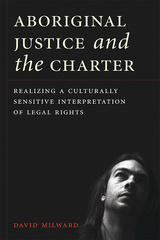
Although Indigenous peoples had their own systems of law based on their social, political, and spiritual traditions, under colonialism their legal systems have often been ignored or overruled by non-Indigenous laws. Today, however, these legal traditions are being reinvigorated and recognized as vital for the preservation of the political autonomy of Aboriginal nations and the development of healthy communities.
The essays in this book present important perspectives on the role of Indigenous legal traditions in reclaiming and preserving the autonomy of Aboriginal communities and in reconciling the relationship between these communities and Canadian governments. Contributors include Andrée Lajoie, Minnawaanagogiizhigook (Dawnis Kennedy), Ghislain Otis, Ted Palys and Wenona Victor, Paulette Regan, and Perry Shawana. Common threads linking the essays include the relationship between Indigenous and Canadian legal orders, the importance of Indigenous legal traditions for Aboriginal communities’ autonomy, and the ways in which these traditions might be recognized and given space in the Canadian legal landscape.
In its examination of different aspects of and models for the recognition of Indigenous legal orders, this book addresses important issues relating to legal pluralism. It will be of interest to a wide audience including lawyers and legal academics, teachers, students, policy makers, and members of Aboriginal communities.
It will be of interest to a wide audience including lawyers and legal academics, teachers, students, policy makers, and members of Aboriginal communities.
Indigenous Legal Traditions explores the role of Indigenous law both within the context of the Canadian legal system, and as an independent structure. This collection of essays offers five different perspectives on the nature of Aboriginal legal traditions ... The essays echo themes of reconciliation, autonomy and identity. The concept of decolonization appears repeatedly, as the authors search for ways to free traditional legal systems from the oppressive and restrictive colonial structure ... Given the wide range of debate on these important issues, readers will find the book a relevant and insightful look into the role, significance, and future of Indigenous legal systems.
The Law Commission of Canada is an independent federal law reform agency that advises Parliament on how to improve and modernize Canada's laws.
Contributors: Dawnis Kennedy, Andrée Lajoie, Ghislain Otis, Ted Palys and Wenona Victor, Paulette Regan, Perry Shawana
Preface
Introduction: Aboriginal Legal Traditions – Which Way Out of Colonialism? / Andrée Lajoie
1 “Getting to a Better Place”: Qwi:qwelstóm, the Stó:lo, and Self-Determination / Ted Palys and Wenona Victor
2 An Apology Feast in Hazelton: Indian Residential Schools, Reconciliation, and Making Space for Indigenous Legal Traditions / Paulette Regan
3 Reconciliation without Respect? Section 35 and Indigenous Legal Orders / Minniwaanagogiizhigook (Dawnis Kennedy)
4 Legal Processes, Pluralism in Canadian Jurisprudence, and the Governance of Carrier Medicine Knowledge / Perry Shawana
5 Territoriality, Personality, and the Promotion of Aboriginal Legal Traditions in Canada / Ghislain Otis
Contributors
Index








